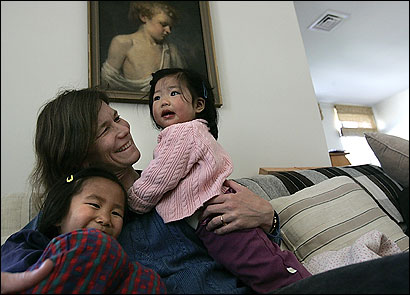China's policies lead to drop in Bay State adoptions
 Andrea Geyling of Milton with daughters Maya, 5, and Kyra, 1. Both girls were adopted from China, which has set limits on the percentage of adoptees who can be placed with single parents. (Suzanne Kreiter/ Globe Staff) |
China's policies lead to drop in Bay State adoptions
Local economy also a factor
By Patricia Wen, Globe Staff | May 1, 2006
Adoptions in Massachusetts have dropped by 6 percent, largely because of a sharp decline in the number of babies from China as well as a struggling local economy, according to one of the most sweeping looks at the state's adoption patterns.
Adoption of babies from China declined by 17 percent during the same time period, after several years of increases, the report showed. The data are the most recent available for adoptions in the state, and many agencies say they believe Massachusetts adoptions from China have continued to decline since then.
The decline is largely the result of the Chinese government's decision to severely limit the number of single people who can adopt, local adoption officials said. They say the Chinese government enforced these rules after being troubled by publicity in the late 1990s over gay parents in the United States raising Chinese babies. Now, agencies say, Chinese officials allow no more than 8 percent of the country's children who are adopted to be placed with single people, and requires all applicants to sign statements that they are not gay or lesbian.
Lillian Zhang, executive director of China Adoption with Love, based in Brookline, said Massachusetts is particularly hard-hit by the Chinese policy because of the high number of educated single women, as well as gays and lesbians, who seek to adopt from this state. Calling it a ''blue state, red state" phenomenon, she speculated that liberal urban centers are more likely to be experiencing a drop in adoptions from China.
National figures from the State Department show a continued rise in adoptions from China through last year, but Zhang said she expects ''a dramatic decline" in Chinese placements across the country in the next decade because there will be fewer children available. She said Chinese officials are encouraging the country's citizens to adopt. They have also launched an aggressive campaign to alter the traditional Chinese rural preference for male over female babies, a preference that resulted in the abandonment of many newborn girls, she said.
The report also provides a broad picture of who is being adopted by parents in Massachusetts. Of the 2,392 children adopted here in 2004, more than half were foreign-born, primarily from China, Russia, South Korea, and Guatemala, and about one-third were foster children in state custody. Fewer than 10 percent were American-born infants affiliated with private agencies.
While the China policy is having a significant effect, adoption officials also attribute the overall decline in Massachusetts adoptions to broader economic and demographic trends, including the state's tight economy that puts adoption fees -- typically more than $20,000 -- out of reach for many families.
''For many people, it's whether you can afford the fees involved," said Vicki Peterson, executive director of Wide Horizons, based in Waltham, which handles roughly 700 adoptions each year nationwide.
Sarah Mraz, director of adoption programs at Wide Horizons, pointed out another trend: There are fewer people of parenting age. Baby boomers are aging out of the child-raising years, a factor that has also been cited in a slowdown in the growth of in vitro fertilization procedures.
''They already have their children, if they wanted to have them," she said.
There is no up-to-date state government source that tracks adoption data. Adoption statistics gathered by the University of Massachusetts are typically released about a year late, because it takes UMass staffers many months to collect data from the more than 50 licensed agencies in the state. There is no national repository of adoption data for every state, and Massachusetts is one of the few states that require this information-gathering annually.
The 2004 decline is the first registered by the center since its first comprehensive look at state adoptions in 2001. There were some upward trends, too: More Massachusetts parents adopted through the foster-care system, which is the lowest-cost alternative, and more sought babies from Guatemala.
Adoption agency officials say the Russian and South Korean governments, among others, are beginning to tighten their rules in response to baby-trafficking cases and internal pressure to care for their own orphans. The United States has joined other countries in negotiating the final terms of the Hague Convention on Intercountry Adoption, which attempts to strengthen and unify rules for foreign adoptions.
Adoptive parents say they know foreign governments can change their rules from year to year, but many patiently persist through considerable red tape.
Andrea Geyling, a 43-year-old teacher from Milton Academy, went to China in March to pick up her 1-year-old baby girl, a sibling for her 5-year-old daughter adopted from the same country. Geyling said she felt lucky to obtain her youngest child within 18 months. Still, she is unhappy about the Chinese restrictions on singles, but realizes there is little she can do about another nation's policies.
Though many adoption agencies said the limitations on singles are a veiled way of discriminating against gays and lesbians, Geyling said she also believes Chinese officials may see two-parent adoptive families as offering the fullest economic and emotional benefits to children.
''It's the Chinese government's prerogative," she said. ''You have to go along."
Patricia Wen can be reached at wen@globe.com. ![]()